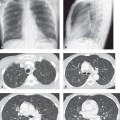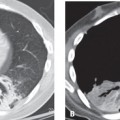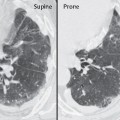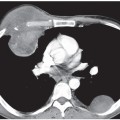CASE 72 35-year-old woman with mental retardation and pre-existing gastric bezoar with a witnessed aspiration and respiratory distress necessitating emergent intubation Baseline AP portable chest X-ray (Fig. 72.1A) demonstrates clear lungs and a heterogeneous gastric mass consistent with her known bezoar. AP portable chest exam (Fig. 72.1B) following the witnessed aspiration and subsequent intubation shows acute onset of air space consolidation in the right lower lobe with hilar extension. Patchy ground glass foci are also seen in the right upper lobe and in the left apex to a lesser degree. Aspiration Pneumonia None Fig. 72.1 Aspiration is the presence of foreign material in the airways of the lung, the sequelae of which depends on the volume and nature of the aspirated material and the frequency of aspiration. Small volumes of aspirate are common and are readily handled by normal defense mechanisms (e.g., glottic closure, cough reflex) without complication. Predisposing risk factors for aspiration are summarized in Table 72.1. Aspiration or inhalation of particulate matter, fluids, or secretions from the stomach and/or oropharynx into the lungs may result in any of four different clinical syndromes: (1) chemical pneumonia (CP), aspiration of gastric acid and contents incites a chemical pneumonitis (Mendelson syndrome); (2) bacterial pneumonia (BP), aspiration of bacteria from the oropharynx; (3) exogenous lipoid pneumonia, aspiration of animal, mineral, or vegetable oil (see Case 113); and (4) foreign body aspiration, which may be complicated by lobar atelectasis, respiratory distress, and bacterial pneumonia. The incidence of CP is not known. BP sequelae of aspiration accounts for 5–15% of cases of community-acquired pneumonia. Aspiration-related nosocomial BP is the second most common cause of nosocomial infection, and the leading cause of death from health care–related infections. CP (Mendelson syndrome
 Clinical Presentation
Clinical Presentation
 Radiologic Findings
Radiologic Findings
 Diagnosis
Diagnosis
 Differential Diagnosis
Differential Diagnosis
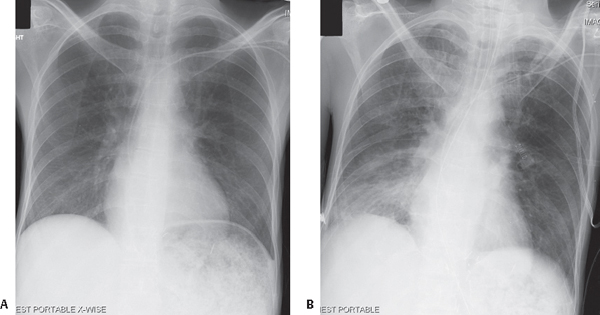
 Discussion
Discussion
Background
Etiology
Clinical Findings
![]()
Stay updated, free articles. Join our Telegram channel

Full access? Get Clinical Tree


